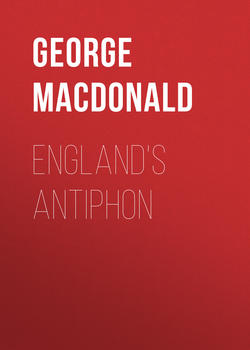Читать книгу England's Antiphon - George MacDonald - Страница 11
CHAPTER V
A LONG FAREWELL TO GLITTERING TRIFLES
ОглавлениеLeave me, O love, which reachest but to dust;
And thou, my mind, aspire to higher things;
Grow rich in that which never taketh rust:
What ever fades but fading pleasure brings.
Draw in thy beams, and humble all thy might
To that sweet yoke where lasting freedoms be;
Which breaks the clouds, and opens forth the light
That doth both shine and give us sight to see.
Oh take fast hold; let that light be thy guide,
In this small course which birth draws out to death;
And think how evil63 becometh him to slide
Who seeketh heaven, and comes of heavenly breath.
Then farewell, world; thy uttermost I see:
Eternal love, maintain thy life in me.
Before turning to the treasury of his noblest verse, I shall give six lines from a poem in the Arcadia—chiefly for the sake of instancing what great questions those mighty men delighted in:
What essence destiny hath; if fortune be or no;
Whence our immortal souls to mortal earth do stow64:
What life it is, and how that all these lives do gather,
With outward maker's force, or like an inward father.
Such thoughts, me thought, I thought, and strained my single mind,
Then void of nearer cares, the depth of things to find.
Lord Bacon was not the only one, in such an age, to think upon the mighty relations of physics and metaphysics, or, as Sidney would say, "of naturall and supernaturall philosophic." For a man to do his best, he must be upheld, even in his speculations, by those around him.
In the specimen just given, we find that our religious poetry has gone down into the deeps. There are indications of such a tendency in the older times, but neither then were the questions so articulate, nor were the questioners so troubled for an answer. The alternative expressed in the middle couplet seems to me the most imperative of all questions—both for the individual and for the church: Is man fashioned by the hands of God, as a potter fashioneth his vessel; or do we indeed come forth from his heart? Is power or love the making might of the universe? He who answers this question aright possesses the key to all righteous questions.
Sir Philip and his sister Mary, Countess of Pembroke, made between them a metrical translation of the Psalms of David. It cannot be determined which are hers and which are his; but if I may conclude anything from a poem by the sister, to which I shall by and by refer, I take those I now give for the brother's work.
The souls of the following psalms have, in the version I present, transmigrated into fairer forms than I have found them occupy elsewhere. Here is a grand hymn for the whole world: Sing unto the Lord.
63
Evil was pronounced almost as a monosyllable, and was at last contracted to ill.
64
"Come to find a place." The transitive verb stow means to put in a place: here it is used intransitively.
